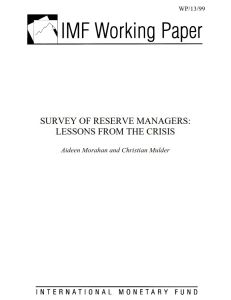
Recommendation
This matter-of-fact, highly revealing report explains the results of a 2012 International Monetary Fund (IMF) survey of reserve banks. The content is quite substantive, including original research, a new way of viewing the fiscal crisis and interesting data. Though the authors provide limited interpretation and little theoretical analysis, their survey reached the people at the center of world-changing events. In the wake of the 2008 financial crisis, the IMF questioned reserve managers from countries rich and poor. Their responses give useful glimpses into how reserve banks handled crucial issues at a time of great stress. Since the report divides the responses into those from advanced, middle-income and low-income countries, it gives a clear sense of how nations’ actions varied according to their position in the world economy. getAbstract recommends this report on national reserve banking practices around the world to bankers, policy makers and those interested in global finance.
Summary
About the Authors
Aideen Morahan works for Ireland’s central bank. Christian Mulder is a senior manager at the World Bank group.








Comment on this summary